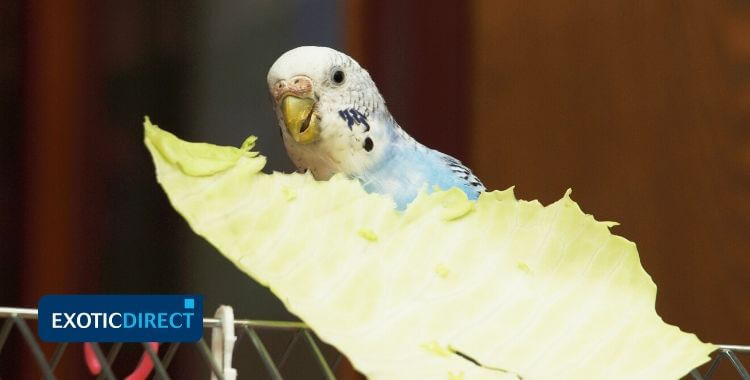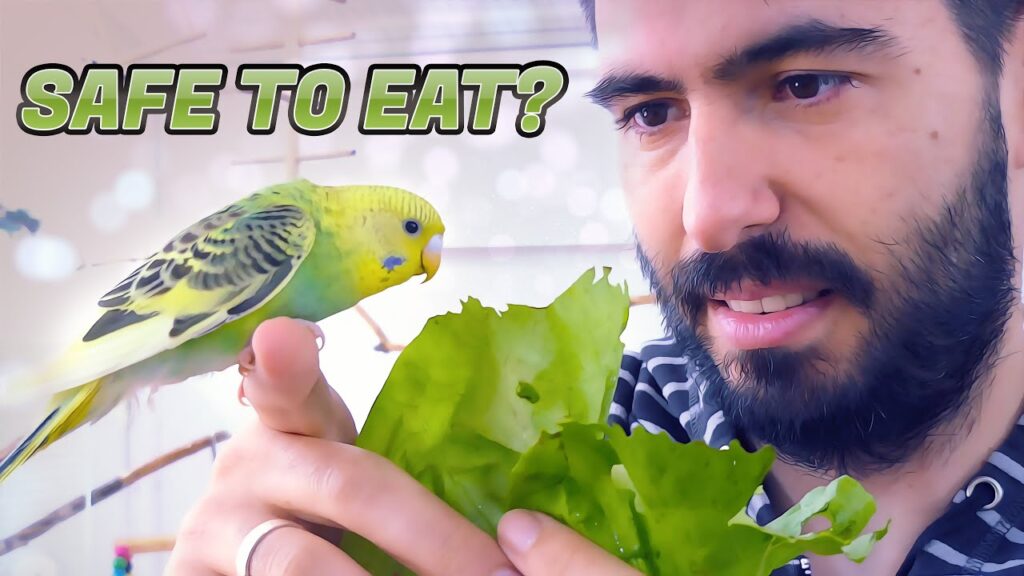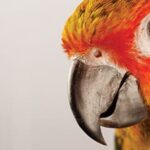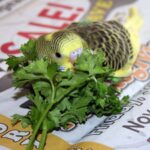Budgies can eat lettuce, but it should be given in moderation. Lettuce offers hydration, although it’s low in nutritional value.
Budgies, popular as cheerful companions, bring owners joy with their vibrant colors and melodies. While seeds comprise a traditional budgie diet, fresh vegetables are essential for providing a balanced nutritional profile. Lettuce, while not harmful, is often not the best choice for these small parrots.
Due to its high water content and limited vitamins, lettuce should play a minor role in their diet compared to more nutrient-dense leafy greens. Owners must also ensure the lettuce is free from pesticides and washed thoroughly before serving. Careful moderation prevents digestive issues that might arise from overconsumption. In creating an optimal diet, it’s about variety, providing budgies with a selection of healthy vegetables along with an appropriate amount of seeds for a well-rounded nutritional palette.

Credit: m.youtube.com
Budgies And Lettuce: A Healthy Match?
Feeding your budgie a balanced diet is vital for its health. Let’s explore if lettuce fits into this healthy regime. Lettuce can be a refreshing snack for your feathered friend. But, it’s important to know which types to offer and their nutritional benefit. We’ll dive into the wonders of lettuce for budgies!
Nutritional Value Of Lettuce For Budgies
Lettuce offers various vitamins and minerals that can complement a budgie’s diet. Key components include:
- Vitamin A for eye health
- Vitamin K for blood clotting
- Fiber for digestive health
However, some lettuce types like iceberg are low in nutrients and high in water. This type might lead to diarrhea if consumed in excess.
Types Of Lettuce Safe For Budgies
Different lettuce types offer different nutritional values. Here’s a rundown of bird-safe varieties:
| Type of Lettuce | Brief Description |
|---|---|
| Romaine | Rich in nutrients and safe for budgies. |
| Red Leaf | Safe and offers a good mix of vitamins. |
| Butterhead | Includes Boston and Bibb varieties, both safe for budgies. |
Select safe and nutrient-rich types for your budgie’s salad. Avoid iceberg lettuce because it’s mostly water and lacks substantial value.

Credit: exoticdirect.co.uk
Lettuce In A Budgie’s Diet: Pros And Cons
Lettuce can be a fresh addition to a budgie’s diet. It offers variety and can be a tasty snack. But is it healthy for them? This section looks at the benefits and risks.
Benefits of Lettuce for BudgiesBenefits Of Lettuce For Budgies
Feeding lettuce to budgies is common. Lettuce is low in calories and provides some hydration. Many budgies enjoy the texture and taste. Varied types, like romaine, are better choices. Darker leaves are usually more nutritious. Benefits include:
- Hydration – Lettuce has a high water content.
- Fiber – It aids in digestion.
- Nutrients – Contains vitamins and minerals, although in small amounts.
Risks And Concerns With Feeding Lettuce
However, not all lettuce is good. For instance, iceberg lettuce should be avoided due to its lack of nutrients. Other risks include:
- Diarrhea – Too much lettuce can cause loose stools.
- Low in calories – Shouldn’t replace calorie-rich foods.
- Pesticides – Only give washed, organic lettuce.
Always ensure lettuce is a small part of the diet. A balanced diet is key.
Varieties Of Lettuce For Your Feathered Friend
Lettuce can be a refreshing snack for budgies, but not all types are the same. Choosing the right variety ensures your budgie gets both enjoyment and nutrition. Let’s dive into the leafy world to find the perfect choices for your feathered companion.
Iceberg vs. Romaine: Which is Better?Iceberg Vs. Romaine: Which Is Better?
Deep green, nutrient-rich lettuces are always a better pick for budgies. Iceberg lettuce, although crispy and tempting, offers little nutritional value due to its high water content.
| Lettuce Type | Nutritional Content |
|---|---|
| Iceberg | Low in vitamins and minerals |
| Romaine | High in fiber, vitamins A, C, K, and folate |
Therefore, Romaine lettuce trumps Iceberg as the better option for your budgie’s health.
Other Safe Greens for BudgiesOther Safe Greens For Budgies
Apart from lettuce, a variety of greens can add vital nutrients to your budgie’s diet. Below is a list of other greens that are both safe and beneficial:
- Spinach (in moderation)
- Kale
- Swiss chard
- Mustard greens
- Broccoli (including leaves and stems)
These greens are packed with vitamins, minerals, and fiber, contributing to a well-rounded diet for your pet bird.
How To Serve Lettuce To Budgies
Introducing fresh vegetables to your budgie’s diet can be beneficial. Lettuce is one such vegetable that’s often considered. Yet, not all types are equal in terms of nutrition. Selecting the right variety and serving it properly is key to your budgie’s health.
Preparing Lettuce For Eating
- Choose dark, leafy varieties like romaine or red leaf for higher nutrition.
- Wash thoroughly to remove any pesticides or contaminants.
- Chop into small, manageable pieces to make it easy for the budgies to eat.
- Avoid iceberg lettuce, as it’s mostly water and offers little nutritional value.
- Prior to serving, make sure to drain any excess water to prevent a messy cage.
Portion Sizes And Frequency
While lettuce can be a refreshing treat, it’s important to maintain balance. Introduce lettuce gradually into their diet with small portions.
| Age of Budgie | Portion Size | Frequency |
|---|---|---|
| Young Budgies | 1-2 small pieces | Once a week |
| Adult Budgies | 2-3 small pieces | Twice a week |
Observe your budgie for any signs of digestive discomfort or allergies. Adjust portion sizes and frequency accordingly. Variety is crucial—combine lettuce with other safe vegetables for a well-rounded diet.
Alternatives To Lettuce In A Budgie’s Diet
While lettuce can be a watery snack with little nutritional value for your feathery friend, there are plenty of other vibrant veggies and fruits that can liven up your budgie’s diet. It’s essential to provide a variety of food to ensure they get the nutrients they need. Let’s explore some of the superior alternatives that can help keep your budgie chirpy and healthy!
Recommended Veggies And Fruits
Budgies relish a rich assortment of veggies and fruits. Here is a list of some they adore:
- Broccoli – packed with vitamins
- Carrots (and carrot tops) – full of beta-carotene
- Kale – a nutrient powerhouse
- Peppers – colorful and vitamin-rich
- Sweet potatoes – a healthy, beta-carotene treat
These treats are not just tasty but also provide essential nutrients that lettuce lacks. In moderate amounts, the fruits such as:
- Apples (minus the seeds)
- Bananas – a potassium-rich choice
- Blueberries – full of antioxidants
- Peel-less Oranges – for a vitamin C kick
are wonderful for your bird’s wellbeing. Make sure to wash all fresh produce to remove pesticides and slice them into budgie-sized bites before serving.
Potential Hazards In A Budgie’s Diet
Not all foods that humans consume are safe for budgies. Beware of:
| Food Type | Reason for Hazard |
|---|---|
| Avocado | Toxic to birds |
| Chocolate | Contains theobromine, a lethal ingredient for birds |
| Apple Seeds | Cyanide compounds may harm budgies |
| Citrus Fruits | Too acidic and may distress a budgie’s stomach |
| Certain Beans (Raw) | Can be toxic if not cooked properly |
Protect your budgie by avoiding these dangerous foods. Always check with a vet before introducing new foods to your pet’s diet.
“` Please note that this content is provided for a hypothetical blog post and should be checked for accuracy and suitability before being used.Hydration And Nutrition: Striking A Balance
Striking the right balance between hydration and nutrition is vital for a budgie’s health. Lettuce can be part of this equilibrium. Read on to understand how water-rich vegetables like lettuce can benefit your feathery friend.
The Role Of Water In Leafy Greens
Leafy greens, like lettuce, are loaded with water. This can be a hydrating treat for budgies, especially during hot days. But remember, not all lettuces are equal. Always choose varieties that also provide nutritional value.
- Romaine lettuce – High in water and nutrients
- Iceberg lettuce – High in water but low in nutrients
- Dark leafy greens – Always a better choice
Ensuring A Balanced Budgie Diet
For optimal health, budgies require a varied diet. It should include seeds, pellets, fruits, and vegetables. Leafy greens can be a part, but should not be the only vegetable offered.
| Food Type | Frequency | Benefits |
|---|---|---|
| Seeds | Daily | Energy and fats |
| Pellets | Daily | Complete nutrition |
| Fruits | Weekly | Vitamins and fibers |
| Vegetables | Daily | Minerals and hydration |
Always introduce new foods gradually. Observe how your budgie reacts to lettuce. If it causes loose stools, reduce the amount or try another vegetable.
Training Budgies To Enjoy Vegetables
Introducing fresh vegetables to your budgies can work wonders for their health. Lettuce and other greens are packed with essential vitamins and minerals. But, you might wonder, “will my budgie eat these veggies?” Training your budgie to enjoy the goodness of greens can be a delightful journey. Let’s take a look at how to get your feathery pals excited about their leafy treats.
Getting Started With Veggies
First, understand what veggies are safe. Budgies can eat several types of lettuce, except iceberg, which offers little nutrition. Start with small amounts of romaine or leaf lettuce. Present it in a way that entices your budgie.
- Chop the lettuce into small pieces.
- Mix it with their regular seed blend.
Encouraging A Taste For Greens
To foster a love for veggies in your budgie, patience is key. They might not show interest at first, but don’t give up. Try these tips to help them develop a taste for greens:
- Introduce fresh lettuce alongside favourite foods.
- Hand feed to create a bond and associate you with treats.
- Use positive reinforcement; praise them when they try something new.
Remember, a balanced diet ensures a happy and healthy budgie.

Credit: birdqueries.com
Understanding Budgie Dietary Requirements
Budgies, with their vibrant plumage and chirpy songs, need a balanced diet to thrive. Many wonder if vegetables like lettuce can be a part of their diet. Before introducing any new food to your budgie, you must understand what makes a healthy meal for these feathered friends.
Must-have Nutrients For Budgies
Budgies require a mix of essential nutrients to maintain their health and energy. A good budgie diet includes:
- Proteins: For feather growth and tissue repair.
- Vitamins and Minerals: Vital for bodily functions and preventing illness.
- Carbohydrates: They provide energy for daily activities.
- Fats: Necessary in small amounts for energy reserves and vitamin absorption.
Provide a diet that combines seeds, fresh fruits, vegetables, and pellets to cover these essential nutrients.
Avoiding Dietary Deficiencies
Neglecting any nutrient group can lead to health issues in budgies. To prevent deficiencies:
- Ensure a varied diet that includes all necessary vitamins and minerals.
- Introduce new foods like lettuce gradually, and in moderation, to avoid digestive problems.
- Monitor your budgie’s food intake and behavior for signs of poor nutrition.
- Consult with a vet to tailor a diet plan if your budgie shows any health issues.
Balance is key in feeding budgies. Lettuce can be a part of their diet, but it should not replace other foods rich in nutrients. Always choose dark, leafy types of lettuce over lighter varieties, as they are more nutrient-dense.
Common Questions On Budgies And Lettuce
Budgie owners often wonder about the best greens for their feathered friends. Lettuce frequently comes up in this discussion. Is it safe? Can it be a part of their daily diet? Let’s dive into the leafy details and answer some common questions.
Can Budgies Eat Lettuce Daily?
While budgies can eat lettuce, it should not be their daily green of choice. Lettuce is rich in water but low in nutritional value, especially iceberg lettuce. Here’s what a budgie’s weekly green diet could include:
- Monday: Spinach
- Tuesday: Kale
- Wednesday: A few lettuce leaves
- Thursday: Broccoli tops
- Friday: Dandelion greens
- Saturday: Swiss chard
- Sunday: Rest day with no greens
Is Iceberg Lettuce Harmful To Budgies?
While not toxic, iceberg lettuce offers minimal nutrition and is mostly water. It can lead to runny droppings due to its high water content. Moderation is key. Instead of daily servings, consider offering it sparingly. Here’s a more nutritious green mix for budgies:
| Green Vegetable | Benefits |
|---|---|
| Spinach | Rich in vitamins A, C, and K. |
| Kale | High in nutrients and antioxidants. |
| Dandelion Greens | Contains calcium and iron. |
| Swiss Chard | Packed with vitamins and minerals. |
| Broccoli | Full of fiber and vitamin C. |
Expert Opinions And Bird Owner Experiences
Exploring the best foods for your feathered friend is crucial for their health and happiness. Expert opinions and real-life bird owner experiences shed light on the question: Can budgies eat lettuce? Let’s dive into the world of avian nutrition with insights from vets and stories from those who share their lives with these beautiful birds.
Veterinary Advice On Bird Diets
Vets recommend a variety of foods for budgies. A good diet includes seeds, vegetables, and occasional fruits. The topic of offering lettuce to budgies brings up some vital points:
- Iceberg lettuce, commonly known for its high water content, holds minimal nutritional value. Thus, it is less favored by vets.
- When considering lettuce, dark leafy variants like romaine are better. They offer more nutrients important for bird health.
- Introducing new foods should be gradual. Vets advise watching for changes in droppings as a sign of digestive upset.
Always remember to wash all vegetables to remove pesticides before offering them to your budgie.
Community Insights From Budgie Owners
Budgie owners actively share their experiences on forums and social media. These are treasures of practical tips on feeding lettuce to budgies:
- Many owners find that their budgies enjoy the crisp texture of romaine lettuce.
- However, some report that too much lettuce can cause diarrhea in their pets.
- Within the community, there’s a consensus that variety is key. Alongside lettuce, offering foods like broccoli, carrots, and kale is beneficial.
Overall, incorporating the experiences of fellow budgie enthusiasts can guide new bird owners towards creating a balanced diet for their companions.
Conclusion
Feeding your budgie lettuce can be a healthy addition to its diet, but moderation is key. Lettuce provides hydration and variety, yet lacks significant nutritional value. Aim to serve a balanced diet rich in diverse fruits and veggies for your feathered friend’s well-being.
For more tips on pet care and nutrition, keep exploring our blog. Together, let’s ensure our budgies thrive with vibrant health!
Ryan Everhart is a passionate bird enthusiast and blogger, primarily writing on his website, Avian Whispers. His journey into the world of bird blogging began with a deep interest in parrots, a species that captivated his attention for their intelligence and social behavior. Over time, his content expanded to cover a broader range of bird species, offering insights into bird behavior, care, habitats, and conservation.
Ryan is dedicated to educating his audience, which includes both new bird owners and seasoned enthusiasts. His writing is filled with personal experiences, expert knowledge, and practical advice on bird care. Through Avian Whispers, he aims to foster a deeper appreciation for birds, emphasizing their role in nature and the joys of having them as pets.
Starting with articles focused on parrots, Ryan’s work now encompasses a diverse range of topics such as feeding, training, habitat enrichment, and bird health. His love for birds extends beyond parrots, diving into various avian species. His informative and heartfelt writing reflects his commitment to the well-being of birds and the desire to help others connect with these creatures.
As a growing voice in the bird blogging community, Ryan strives to provide a platform where bird lovers can learn, share experiences, and connect over a shared passion for avian life. His blogs are not only educational but also serve as a reminder of the importance of protecting and nurturing the bond between humans and birds.




